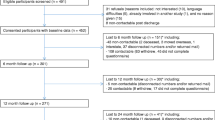Abstract
In light of Delahanty et al.'s (1997) identification of attribution of responsibility for a motor vehicle accident (MVA) as a powerful determinant of initial level of distress from the trauma and of early remission of PTSD, we reexamined data from Blanchard and Hickling's (1997) prospective follow-up of 158 MVA survivors. Despite differences between the two samples (Delahanty sample recruited from hospitals 2–3 weeks post-MVA and predominantly male; our sample recruited from outpatient care 1–4 months post-MVA and predominantly female) we replicated Delahanty's findings: those with PTSD who blame themselves for the MVA are less symptomatic initially and recover more rapidly in the first 6 months than those with PTSD who blame another party for the accident.
Similar content being viewed by others
References
American Association of Automotive Medicine (1985). The Abbreviated Injury Scale (Revised). Des Plaines, IL.
American Psychiatric Association (1987). Diagnostic and Statistical Manual of Mental Disorders (3rd Edition, Revised). American Psychiatric Association: Washington, DC.
Baker, S. P., O'Neill, B., Haddon, W., & Long, W. B. (1974). The Injury Severity Score: A method for describing patients with multiple injuries and evaluating emergency care. Journal of Traumatic Stress, 14, 187–196.
Blake, D. D. (1994). Rationale and development of the Clinician-Administered PTSD Scales. PTSD Research Quarterly, 5, 1–2.
Blake, D., Weathers, F., Nagy, L., Kaloupek, D., Klauminzer, G., Charney, D., & Keane, T. (1990a). Clinician-Administered PTSD Scale (CAPS). National Center for Posttraumatic Stress Disorder, Behavioral Science Division-Boston VA: Boston, MA.
Blake, D., Weathers, F., Nagy, L., Kaloupek, D., Klauminzer, G., Charney, D., & Keane, T. (1990b). Clinician-Administered PTSD Scale (CAPS), Form 2-One-Week Symptom Status Version. National Center for Posttraumatic Stress Disorder, Behavioral Science Division-Boston VA: Boston, MA.
Blanchard, E. B., & Hickling, E. J. (1997). After the crash: Psychological assessment and treatment of survivors of motor vehicle accidents. American Psychological Association: Washington, DC.
Blanchard, E. B., Hickling, E. J., Forneris, C. A., Taylor, A. E., Buckley, T. C., Loos, W. R., & Jaccard, J. (1997). Prediction of remission of acute posttraumatic stress disorder in motor vehicle accident victims. Journal of Traumatics Stress, 10, 215–234.
Bulman, R., & Wortman, C. B. (1977). Attribution of blame and coping in the “real world”: Severe accident victims react to their lot. Journal of Personality and Social Psychology, 35, 351–363.
Delahanty, D. L., Herberman, H. B., Craig, K. J., Hayward, M. C., Fullerton, C. S., & Ursano, R. J. (1997). Acute and chronic distress and posttraumatic stress disorder as a function of responsibility for serious motor vehicle accidents. Journal of Consulting and Clinical Psychology, 65, 560–567.
Endicott, J., Spitzer, R., Fleiss, J., & Cohen, J. (1997). The Global Assessment Scale: A procedure for measuring overall severity of psychiatric disturbance. Archives of General Psychiatry, 33, 766–711.
Horowitz, M. J., Wilmer, N., & Alvarez, N. (1979). Impact of Event Scale: A measure of subjective stress. Psychosomatic Medicine, 41, 209–218.
Janoff-Bulman, R., & Frieze, I. H. (1983). A theoretical perspective for understanding reactions to victimization. Journal of Social Issues, 39, 1–17.
Lazarus, R. S., & Folkman, S. (1984). Stress, appraisal, and coping. NY: Springer.
Spitzer, R. L., Williams, J. B. W., Gibbon, M., & First, M. B. (1990). Structured Clinical Interview for DSM-III-R, non-patient edition (SCID-NP) (Version 1.0). American Psychiatric Press: Washington, DC.
Vitaliano, P.P., Russo, J., Carr, J. E., Maiuro, R. D., & Becker, J. (1985). The Ways of Coping Checklist: Revision and psychometric properties. Multivariate Behavioral Research, 20, 3–26.
Author information
Authors and Affiliations
About this article
Cite this article
Hickling, E.J., Blanchard, E.B., Buckley, T.C. et al. Effects of Attribution of Responsibility for Motor Vehicle Accidents on Severity of PTSD Symptoms, Ways of Coping, and Recovery Over Six Months. J Trauma Stress 12, 345–353 (1999). https://doi.org/10.1023/A:1024784711484
Issue Date:
DOI: https://doi.org/10.1023/A:1024784711484




